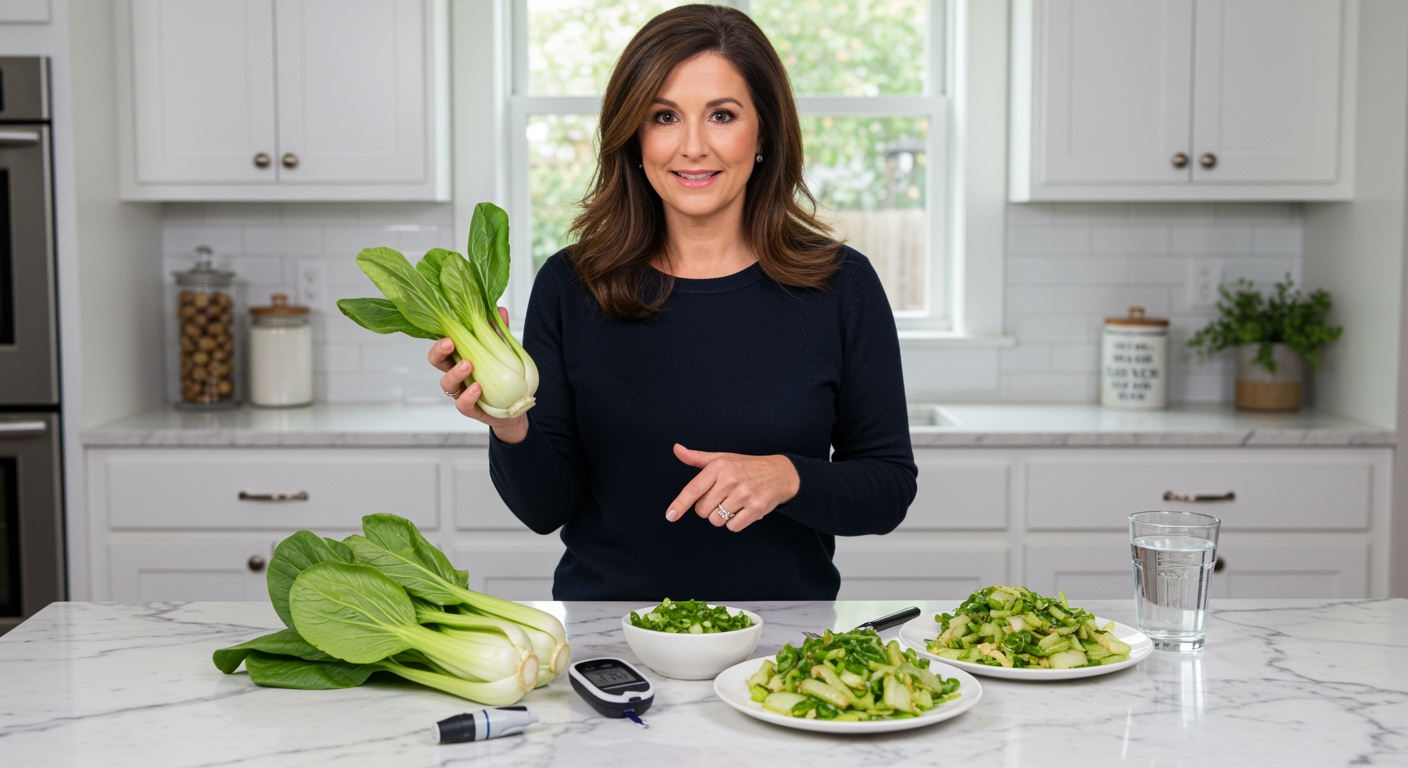✪ Key Takeaway: Bok choy is excellent for diabetes with a glycemic index of 10, providing blood sugar stability and essential nutrients.
Introduction
You walk through the produce section and spot those crisp white stems with dark green leaves.
You might wonder if this Asian vegetable called bok choy fits into your diabetes meal plan without spiking your blood sugar.
Hi, I’m Abdur, your nutrition coach and today I’m going to explain exactly how bok choy affects your blood glucose levels and why it deserves a permanent spot in your diabetes-friendly kitchen.
What Makes Bok Choy Perfect For Diabetes?
Bok choy ranks as one of the lowest glycemic foods you can eat with a glycemic index of just 10.
This means your blood sugar will barely budge when you eat it.
The glycemic load of bok choy is practically zero at 0.1 per serving.
Your pancreas will thank you because it won’t need to pump out extra insulin to handle this vegetable.
One cup of chopped bok choy contains only 1.5 grams of carbohydrates and less than 10 calories.
The fiber content helps slow down any sugar absorption from other foods you eat with your meal.
This blood sugar stability makes bok choy an ideal foundation for your diabetes meal planning.
✪ Fact: Bok choy contains 95% water, making it one of the most hydrating vegetables for people with diabetes.
How Does Bok Choy Support Your Blood Sugar Control?
The fiber content in bok choy works like a natural blood sugar buffer in your digestive system.
When you eat bok choy with other foods, the fiber slows down how quickly your body absorbs glucose.
This creates a steady release of energy instead of sharp blood sugar spikes.
Your insulin sensitivity may improve over time when you regularly include low-glycemic vegetables like bok choy in your meals.
The antioxidants in bok choy help reduce inflammation that can interfere with proper insulin function.
Chronic inflammation makes your cells resistant to insulin, leading to higher blood sugar levels.
Regular consumption of anti-inflammatory foods like bok choy supports better glucose metabolism throughout your body.
✪ Pro Tip: Eat bok choy at the beginning of your meal to maximize its blood sugar stabilizing effects.
What Nutrients Does Bok Choy Provide For Diabetics?
Bok choy delivers vitamin K which plays a crucial role in glucose metabolism and insulin sensitivity.
One cup provides over 60% of your daily vitamin K needs without any impact on blood sugar.
The folate content supports healthy blood vessel function, which is especially important for people managing diabetes.
High blood sugar can damage your blood vessels over time, but folate helps protect against this damage.
Bok choy contains potassium that helps regulate blood pressure, a common concern for diabetics.
The calcium in bok choy supports bone health, which becomes more important as diabetes can affect bone density.
These essential minerals work together to support your overall health while keeping your blood sugar stable.
✪ Note: Bok choy provides more calcium per calorie than milk, making it excellent for diabetic bone health.
How Should You Prepare Bok Choy For Best Results?
Raw bok choy in salads gives you the maximum fiber benefit for blood sugar control.
The crunchy texture also helps you eat more slowly, which naturally helps prevent blood sugar spikes.
Light steaming preserves most nutrients while making the vegetable easier to digest for some people.
Avoid overcooking bok choy as this breaks down the fiber structure that helps with blood sugar management.
Stir-frying with minimal oil keeps the glycemic impact low while adding satisfying flavors to your meals.
You can add garlic, ginger, or herbs without worrying about blood sugar effects.
Pairing bok choy with lean proteins creates balanced meals that keep your glucose levels steady for hours.
✪ Pro Tip: Cook bok choy for no more than 3-4 minutes to preserve its blood sugar benefits and crisp texture.
Are There Any Concerns With Bok Choy And Diabetes?
Bok choy is generally safe for everyone with diabetes, but a few considerations exist.
People taking blood thinning medications should monitor their vitamin K intake from bok choy.
The high vitamin K content can affect how these medications work in your body.
Always discuss significant dietary changes with your healthcare provider if you take prescription medications.
Some people experience digestive discomfort when eating large amounts of raw cruciferous vegetables like bok choy.
Start with smaller portions and gradually increase your intake to allow your digestive system to adjust.
The oxalate content in bok choy is relatively low compared to other leafy greens, making it suitable for most people.
✪ Note: Bok choy contains natural compounds that may support thyroid health when eaten as part of a balanced diet.
The Bottom Line
Bok choy stands out as one of the best vegetables for diabetes management with its ultra-low glycemic index and impressive nutrient profile.
The best foods for diabetes are often the simplest ones that nature provides without any processing or modification.
I would love to hear about your experience with bok choy or any questions you might have about incorporating it into your diabetes meal plan in the comments below.
References
At NutritionCrown, we use quality and credible sources to ensure our content is accurate and trustworthy. Below are the sources referenced in creating this article:
- Diabetes Food Hub: Everything You Need to Know About Bok Choy
- January AI: Bok Choy Glycemic Index
- University of Washington: Glycemic Index Guide
- Maya Feller Nutrition: Bok Choy Nutrition Facts





